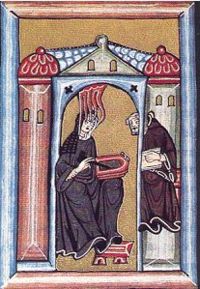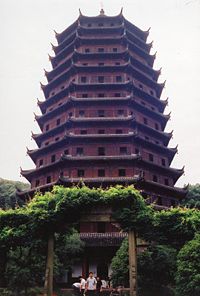12th century
2008/9 Schools Wikipedia Selection. Related subjects: General history
| Millennium: | 2nd millennium |
|---|---|
| Centuries: | 11th century · 12th century · 13th century |
| Decades: | 1100s 1110s 1120s 1130s 1140s 1150s 1160s 1170s 1180s 1190s |
| Categories: | Births – Deaths Establishments – Disestablishments |
As a means of recording the passage of time, the 12th century is the period from 1101 to 1200 in accordance with the Julian calendar in the Christian Era. In the history of European culture, this period is considered part of the High Middle Ages and is sometimes called the Age of the Cistercians. In Song Dynasty China an invasion by Jurchens causes a political schism of north and south. The Khmer Empire of Cambodia flourished during this century, while the Fatimids of Egypt were overtaken by the Ayyubid dynasty.
See also: Renaissance of the 12th century
Events
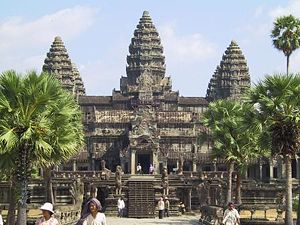
The temple complex of Angkor Wat, built during the reign of Suryavarman II in Khmer era Cambodia.
- 1102, King Coloman unites Hungary and Croatia under the Hungarian Crown
- 1111. On January 11, 1111: At 11:11:11, the date will read 1111-01-11:11:11:11. This will not happen again until 2222.
- c. 1119, Foundation of the Knights Templar
- c. 1121, Battle of Didgori, the greatest military victory of Georgia. King David the Builder with 40,000 Georgians, 15,000 Kipchak auxiliaries, 500 Alan mercenaries and 300 French Crusaders defeated Seljuk led muslim coalition army of 400 000.
- 1122, Battle of Beroia results in the disappearance of the Pechenegs as an independent force.
- 1125, Battle of Azaz between the Crusader States and the Seljuk Turks.
- 1127, The Northern Song dynasty loses power over Northern China to the Jurchens of Manchuria.
- 1128, Portugal gains independence from the kingdom of León (recognised by León in 1143).
- 1130– 1180, Fifty-year drought in the American Southwest.
- 1132, The Southern Song Dynasty establishes China's first permanent standing navy, although China had a long naval history prior. The main admiral's office was stationed at the port of Dinghai.
- 1132– 1183, the Chinese navy increases from a mere 3000 marine soldiers to 52,000 marine soldiers stationed in 20 different squadrons. Between this time, hundreds of treadmill-operated paddle wheel craft are assembled for the navy, in order to combat the Jurchen's Jin Dynasty in the north.
- 1135– 1154, The Anarchy is a period of civil war in England.
- 1136, Suger begins rebuilding abbey church at St Denis north of Paris, which is regarded as the first major Gothic building.
- 1139, Battle of Ourique against the Almoravides led by Ali ibn Yusuf. After this battle on July 26 the Independence of Portugal is declared: Prince Afonso Henriques becomes Afonso I, King of Portugal.
- 1140– 1150, Collapse of the Ancestral Puebloan culture at Chaco Canyon
- 1145– 1148, The Second Crusade is launched in response to the fall of the County of Edessa.
- 1147, A new Berber dynasty, the Almohads, led by Emir Abd al-Mu'min, takes North Africa from the Almoravides and soon invades the Iberian Peninsula. The Almohads began as a religious movement to rid Islam of impurities.
- 1147, The Wendish Crusade against the Polabian Slavs (or " Wends") of what is now northern and eastern Germany.
- 1154, the Moroccan-born Muslim geographer Muhammad al-Idrisi publishes his Geography.
- 1161, the Song Dynasty Chinese navy, employing gunpowder bombs launched from trebuchets, defeat the enormous Jin Dynasty navy on the Yangtze River, in the Battle of Tangdao and the Battle of Caishi.
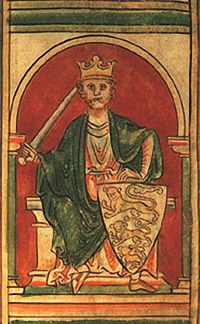
Richard I of England, or Richard the Lionheart.
- 1162, Genghis Khan, founder of the Mongol Empire, born as Temüjin.
- 1168, King Valdemar I of Denmark conquers Arkona on the Island of Rügen, the strongest pagan fortress and temple in Northern Europe.
- 1169, start of the conquest of Ireland. Richard fitzGilbert de Clare ('Strongbow') makes an alliance with the exiled Irish chief, Dermot MacMurrough, to help him recover his kingdom of Leinster.
- 1170, Thomas Becket is murdered.
- 1171, Saladin deposes the last Fatimid Caliph Al-'Āḍid, initiating the Ayyubid dynasty.
- 1178, Chinese writer Zhou Qufei, a Guangzhou customs officer, wrote of an island far west in the Indian Ocean (possibly Madagascar), from where people with skin "as black as lacquer" and with frizzy hair were captured and purchased as slaves by Arab merchants.
- 1180- 1185, the Genpei War in Japan
- 1185, Founding of the cathedral school (Katedralskolan) in Lund, Sweden. The school is the oldest in northern Europe, and one of the oldest in Europe as a whole.
- 1185, beginning in this year the Kamakura Shogunate deprives the Emperor of Japan of political power.
- 1187, Battle of Hattin: Saladin defeats the king of Jerusalem.
- 1189– 1192, The Third crusade was an attempt by European leaders to reconquer the Holy Land from Saladin.
- 1192, Battle of Jaffa, King Richard the Lionheart defeats Saladin.
- 1193, Nalanda, the great Indian Buddhist educational centre, is destroyed.
- 1199 — Pope Innocent III writes to Kaloyan, inviting him to unite the Bulgarian Church with the Roman Catholic Church.
- c. 1200, The Toltec Empire collapses.
- Renaissance of the 12th century in Europe.
- Gothic Architecture begins in France
- Conflict between the Khmer Empire and Champa. Angkor Wat is built under the Hindu king Suryavarman II. At the end of the century the Buddhist Jayavarman VII becomes ruler.
- Pope Adrian IV grants over lordship of Ireland to Henry II of England.
- The medieval Serbian state formed by Stefan Nemanja and continued by the Nemanjić dynasty.
- Pierre Abelard teaches.
- Expansion of the Tu'i Tonga Empire
Significant people
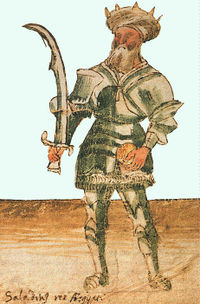
A 15th century depiction of Saladin
- Baldwin IV of Jerusalem, whose death brought about the war upon his country.
- Adrian IV, cathedral* Alexander III, Pope
- Saint Bernard, Abbot of Clairvaux
- David the Builder, King of Georgia
- Tamar of Georgia, Queen of Georgia
- Francis of Assisi, Christian saint
- Genghis Khan, Great Khan of the Mongol Empire
- Bhaskara, towering figure in several disparate fields of mathematics
- Pierre Abailard, one of the first scholastic philosophers; author of "Historia calamitatum mearum", a confessional account of his life (including a description of his love affair with Héloïse)
- Bernard of Clairvaux, French abbot influential in church politics
- William Marshal, knight and statesman
- Manuel I Comnenus, Byzantine Emperor who allied with the Crusaders
- Saladin, ruler of Egypt and Syria who resisted the Crusaders
- Philip Augustus, French king
- Friedrich Barbarossa, Holy Roman Emperor
- Emperor Huizong of Song, China
- Richard of St. Victor, theologian
- Alfonso I Henriques, first king of Portugal
- Maimonides, leading Jewish philosopher
- Muhammad of Ghor, Afghan ghorid dynasty ruler
- Yue Fei, famous Chinese general
- Thomas Becket, archbishop of Canterbury
- Minamoto no Yoritomo, shogun of Japan, founder Kamakura Shogunate
- Lin Tinggui, Chinese painter of Buddhist themes
- Zhou Jichang, Chinese painter of Buddhist themes
- Zhang Zeduan, Chinese painter of the panoramic painting Along the River During Qingming Festival
- Omar Khayyám, Persian poet and astronomer
- Eleanor of Aquitaine, queen consort of France and later the Kingdom of England
- Hildegard of Bingen, polymath and first Western musical composer known by name
- Shao Yong, Chinese poet, historian, and philosopher
- Suryavarman II, Khmer king
- Jayavarman VII, Khmer king
- Ibn Rushd, philosopher
- Richard I of England, king of England who led the Third Crusade
- Prithviraj Chauhan, king of Ajmer in India
- William of Malmesbury, English historian
- Zhu Xi, Neo-Confucian philosopher from China
- Zhu Yu, Chinese maritime author
Inventions, discoveries and introductions
- Beginning of the Gothic architecture style in France.
- Building of Angkor Wat in Khmer empire.
- First European universities founded.
- Christian humanism becomes a self-conscious philosophical tendency in Europe.
- Earliest record of a miracle play, in Dunstable, England.
- Beginning of trouvère music and poetry in France.
- Beginning of the Ars antiqua period in the history of Western European music.
- The Madrid Skylitzes manuscript illustrates the Synopsis of Histories by John Skylitzes.
- Earliest Western account of a mariner's compass, by Alexander Neckam is "De utensilibus" (see Shen Kuo).
- Although known in China since the 5th century BC, the blast furnace for smelting cast iron first appears in Europe, in and around Lapphyttan, Sweden, as early as 1150 AD.
- First fire and plague insurance (in Iceland).
- First authenticated influenza epidemics.
- Invention of the Kente cloth.
- Start of Middle English.
- Hoysala architecture reaches a peak.
- Shahab al-Din Suhrawardi (1155–1191) founder of school of illumination (Ishraq).
- 1165 — The Liuhe Pagoda of Hangzhou, China, is built.
- 1111 — The Chinese Donglin Academy is founded
- 1107 — The Chinese engineer Wu Deren combines the mechanical compass vehicle of the South Pointing Chariot with the distance-measuring odometer device.
- The Durham Cathedral of England is completed.
- The kasbah of Marrakesh is built, city gate Bab Agnaou and the Koutoubia mosque.
- 1104 — The Venice Arsenal of Venice, Italy, is founded. It employed some 16000 people for the mass production of sailing ships in large assembly lines, hundreds of years before the Industrial Revolution.
Decades and years
|
|||||||||||||||||||||||||||||||||||||||||||||||||||||||||||||||||||||||||||||||||||||||||||||||||||||||||||||||||||||||||||||||||||||||||
|
|||||||||||||||||||||||||||||||||||||||||||||||||||||||||||||||||||||||||||||||||||||||||||||||||||||||||||||||||||||


